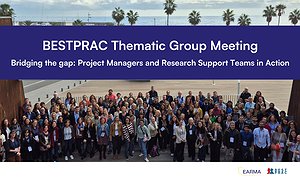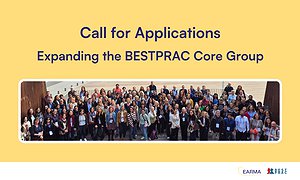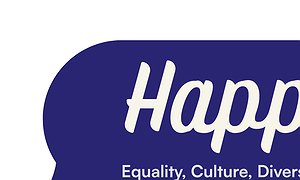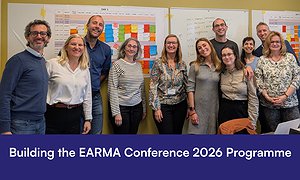Insights from EARMA AI Day on Horizon Europe Proposals and Evaluations
Introduction
The EARMA AI Day event was a cornerstone in unravelling the intricate web of technology's evolution, specifically concentrating on the adaptability of research managers to the AI revolution and its application in Horizon Europe proposals and evaluations.
Throughout the event, opened by Nik Claesen (EARMA Managing Director), esteemed speakers and panellists offered profound insights into the challenges, opportunities, and ethical considerations surrounding the incorporation of AI in the realm of research management.
Avi Staiman, Founder & CEO, Academic Language Expert - Introduction to AI in Proposal Writing
Avi Staiman, in his insightful exploration of AI in proposal writing, underscored the rapid evolution of technology post the AI revolution, questioning how research managers are adapting. He emphasised the significance of considering human inherent components when employing AI, cautioning against misconceptions related to tools like ChatGPT.
Staiman acknowledged ChatGPT as an advanced word predictor that requires support by prompting but stressed the need for critical evaluation of its outputs, addressing misconceptions about consistency expectations. Encouraging responsible integration, he highlighted the efficiency gains possible in proposal writing workflows. Staiman also shared initial concerns about AI capabilities, delving into ChatGPT's multifunctionality and discussed challenges, including hallucinations (fabricating information) and potential impacts on research integrity. His insights touched upon practical use cases and the increasing relevance of AI tools in research, signalling a need for mastery amid evolving technological landscapes.
Panel of Horizon Europe Proposal Writers - Diverse Perspectives
Diverse perspectives emerged from a panel featuring Dr. Tse-Hsiang Chen (EU Grant Advisor & Writer, University Medical Center Utrecht), Dr. Pilar Orero (Department of Translation and Interpreting and East Asia Studies, Universitat Autònoma de Barcelona), and Dr. Maéva Vignes (Data Scientist Consultant & Funding Advisor at University of Southern Denmark), offering first hand experiences with AI tools in proposal writing, moderated by Dr. Rita Gil Mata (Senior Consultant EU Funding, Impact Funding Europe).
Dr. Tse-Hsiang Chen shared insights into using ChatGPT for language improvement and image creation, stressing the importance of human involvement as a collaborative effort with AI tools. Pilar expressed a preference for human responses over AI tools, emphasising the critical role of originality and human creativity. Meanwhile, Maéva Vignes highlighted the creation of custom tools for text matching and text generation, showcasing the significance of tailored solutions to specific needs. Their collective experience painted a nuanced picture, with initial scepticism transforming into recognition of the usefulness of AI tools, coupled with a commitment to learning and improvement.
Daren Howell (VP of Research Intelligence, Springer Nature) - Using AI to enhance the funding process
Daren Howell's insights shed light on the socio-economic impact of AI, underlining its potential to improve knowledge dissemination. He advocated for well-managed AI to enhance existing funding processes, drawing attention to researchers' positive responses to AI use. The distribution of knowledge through AI was highlighted, emphasising the need for robust best practices. The discussion also addressed ethical concerns, with a notable point that biases often present in AI tools were reflective of biases inherent in the human-generated reference material.
Dave Lewis (Head of AI, School of Computer Science and Statistics, Trinity College Dublin) - The use of AI in proposal writing: Possibilities and Pitfalls
Dave Lewis explored the profound impact of language models and their multitasking abilities, particularly delving into the use of GenAI in generating research ideas and its potential in peer review. Ethical considerations took centre stage, with Lewis underscoring the imperative for researchers to tread cautiously in the new world of AI. The discussion extended to the potential technological supremacy, wherein successful Research Performing Organisations (RPOs) and consultants could swiftly dominate the proposal GenAI market with more advanced generative AI.
Miguel Ruiz and Isabel Vergara (European Commission DG RTD) - European Commission perspective of the use of AI in proposals and evaluations of Horizon Europe
Representatives from the European Commission engaged in discussions regarding the pending official guidelines for AI tool usage in Horizon Europe proposals. They addressed risks, accuracy, validity, appropriateness, and plagiarism, marking a significant stride towards regulating AI applications. The conversation also touched upon the support provided by AI when writing a funding proposal, emphasising that the quality of writing was not what the proposal was assessed on. Ethical considerations were reiterated, underscoring the importance of accountability and acknowledging the limitations of AI tools.
Mihalis Kritikos (European Commission DG RTD ERIS) - Implications of AI on Ethics and Research Integrity in Horizon Europe
Mihalis Kritikos offered a comprehensive overview of the EU's approach to trustworthy AI, rooted in lawful, ethical, and robust considerations. He introduced ethical guidelines focusing on principles such as respect for human autonomy, prevention from harm, fairness, and explicability. An anticipation of upcoming documents and guidelines addressing serious and complex ethical issues in EU-funded research signalled a commitment to shaping an ethical framework for AI applications in research.
Isabel Vergara and Dave Lewis - The implications of AI on Horizon Europe proposal evaluation (Panel of Evaluators and evaluation experts)
The panel of evaluators and evaluation experts engaged in a discourse on the various levels of AI integration in proposals and evaluations. They explored the potential of a human-centric approach, increasing the use of interviews in the proposal process, with potential use of AI in template preparation. The discussion extended to the ethical concerns surrounding AI bias, emphasising ongoing efforts to minimise biases in the evaluation process.
Collaborative Pathways to the Future
The EARMA AI Day discussion illuminated the evolving landscape of AI in research management, placing a strong emphasis on responsible integration, ethical considerations, and the collaborative effort required to navigate challenges and opportunities in Horizon Europe proposals and evaluations. This event served as a dynamic platform for experts to share experiences, articulate concerns, and provide valuable insights into the future trajectory of AI in research. As technology continues to reshape the research landscape, the collaborative synergy between human intellect and AI capabilities emerges as the key to unlocking the full potential of innovation in Horizon Europe proposals and evaluations.
EARMA will remain committed to ensuring that research management develops in step with this burgeoning technological advancement. The Association will establish a thematic group exploring the use of AI in the profession and its impact on the community. Additionally, EARMA will host another AI focused event February 29, 2024, in Brussels. We do hope that you will join us and take part in this interesting and important conversation. Details of the next AI event will be published very shortly on our website. However, you can add your name to our waiting list now and we will contact you to let you know when registration opens.
The creation of this article was supported by ChatGPT.

 All news
All news



